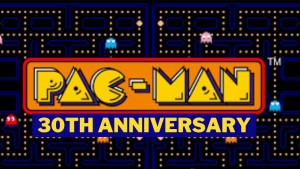About Us
Beyond the Maze: Thinking Like a Store Manager with Pacman 30th Anniversary
Okay, so you're probably thinking, "Pacman? A store management game? Seriously?" Hear me out! While not explicitly labeled as one, the core loop of Pacman 30th Anniversary can actually teach you valuable lessons about managing resources, optimizing routes, and understanding customer behavior – all essential skills for aspiring (or even experienced) store managers.
Forget the ghosts for a second and let's reframe our perspective. Imagine Pac-Man is your store employee, the maze is your shop floor, the pellets are your inventory, the power pellets are your special promotions, and the ghosts are…well, let's say they represent challenges and potential disruptions. Ready to see Pacman in a whole new light? Let's dive in!
Gameplay: The Store Floor in Motion
At its heart, Pacman 30th Anniversary is a game of strategic consumption and risk management. You control Pac-Man, guiding him through a maze filled with pellets. Your objective is to eat all the pellets while avoiding the ghosts. Sounds simple, right? But successful players quickly learn that a purely reactive approach won't get them far.
Think of the maze as your store layout. Where are the most popular aisles (the ones with the most pellets)? Are there any bottlenecks (narrow pathways where ghosts can easily trap you)? Your initial strategy should involve charting a course that efficiently collects the most "inventory" (pellets) with the least amount of travel.
Then there are the power pellets, the game-changers. These allow Pac-Man to turn the tables and temporarily chase the ghosts. In our store management analogy, these are your big promotions. A well-timed promotion (eating a power pellet) can clear out competition (chasing ghosts) and attract more customers (eating pellets). However, the effect is temporary, so you need to use it strategically to maximize its impact.
Finally, the ghosts. These represent a myriad of challenges in the store: inventory shortages, employee absenteeism, unexpected price hikes from suppliers, even a sudden influx of demanding customers. You need to be aware of their movements, anticipate their patterns, and navigate your "store" (the maze) accordingly to minimize their impact on your "inventory" collection.
The longer you play, the faster the game gets. This represents the increasing pressure and complexity of managing a store over time. You need to adapt your strategy, improve your reflexes, and learn from your mistakes to survive and thrive.
Tips for the Aspiring Store Manager (aka, High Score Chaser)
So, how can you translate this newfound appreciation for Pacman 30th Anniversary into practical store management skills? Here are a few tips, framed in the context of both the game and the real world:
- Route Optimization: In Pac-Man, you learn to plan efficient routes to maximize pellet collection. In a store, this translates to optimizing product placement and aisle layout to encourage customer flow and impulse purchases. Consider where your high-demand "pellets" (products) are located and how to guide customers to them while also showcasing other items.
- Resource Management: Power pellets are a limited resource. You need to use them strategically. In a store, this means knowing when and where to deploy your "promotions" (power pellets) for maximum impact. Are you facing a slow day (too many ghosts)? A well-placed sale can clear the aisles and attract more customers.
- Risk Assessment: Ghosts represent potential problems. Understanding their behavior helps you avoid them. Similarly, in a store, you need to anticipate potential risks, such as inventory shortages or customer complaints. Having contingency plans in place is crucial. For example, knowing where the "escape routes" are in the maze (safe zones away from the ghosts) is like knowing where your backup stockroom is located.
- Adaptability: The game gets harder over time, forcing you to adapt your strategy. The same applies to store management. Market conditions change, customer preferences evolve, and new competitors emerge. You need to be flexible and willing to adjust your approach to stay ahead of the curve. If your usual route is blocked by a ghost, find a new one! If a product isn't selling, try a different marketing strategy.
- Learn from Mistakes: Every time you get caught by a ghost, it's a learning opportunity. Analyze your mistakes and adjust your strategy for the next game. Did you get greedy and venture too far into dangerous territory? Did you misjudge the timing of your power pellet? Similarly, in store management, every setback is a chance to learn and improve. Review sales data, analyze customer feedback, and identify areas where you can do better.
Conclusion: Beyond Nostalgia, A New Perspective
While Pacman 30th Anniversary isn't a simulator in the traditional sense, it offers a surprisingly effective way to develop fundamental store management skills. It emphasizes strategic thinking, resource management, and risk assessment in a simple, engaging format. So, the next time you fire up the game, don't just think about eating pellets; think about running a store. You might be surprised at what you learn. And who knows, maybe you'll even break your high score! Good luck, and happy pellet-eating!
